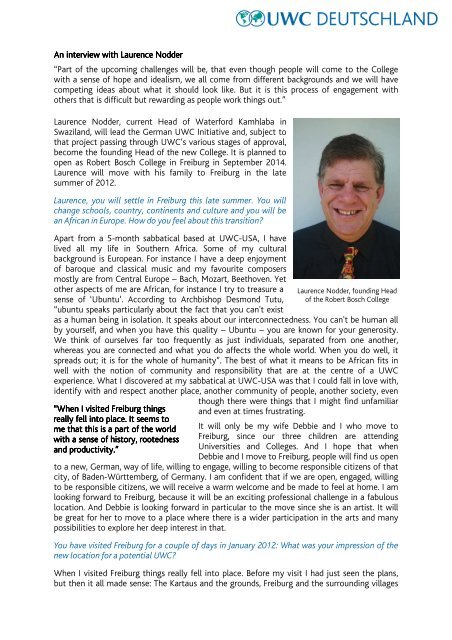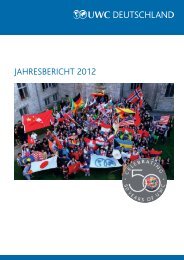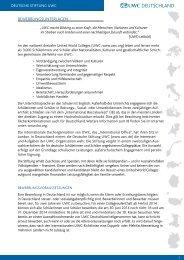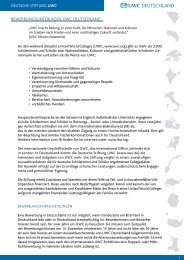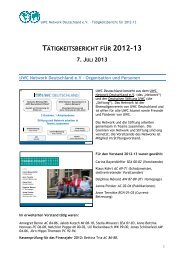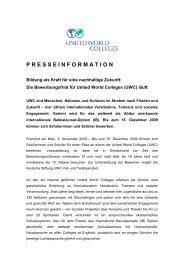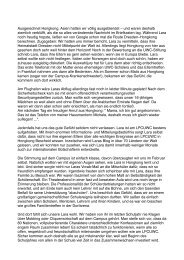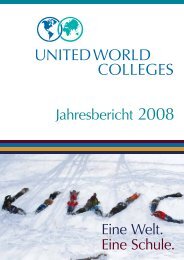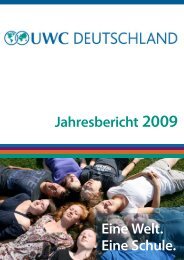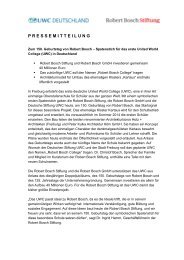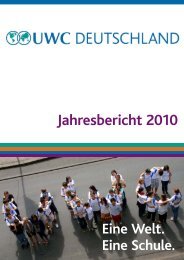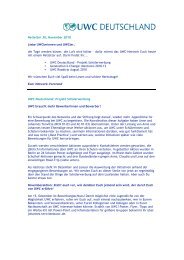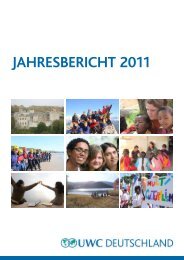An interview with Laurence Nodder - UWC in
An interview with Laurence Nodder - UWC in
An interview with Laurence Nodder - UWC in
You also want an ePaper? Increase the reach of your titles
YUMPU automatically turns print PDFs into web optimized ePapers that Google loves.
<strong>An</strong> <strong>An</strong> <strong><strong>in</strong>terview</strong> <strong><strong>in</strong>terview</strong> <strong>with</strong> <strong>with</strong> <strong>with</strong> <strong>Laurence</strong> <strong>Laurence</strong> <strong>Nodder</strong> <strong>Nodder</strong><br />
<strong>Nodder</strong><br />
“Part of the upcom<strong>in</strong>g challenges will be, that even though people will come to the College<br />
<strong>with</strong> a sense of hope and idealism, we all come from different backgrounds and we will have<br />
compet<strong>in</strong>g ideas about what it should look like. But it is this process of engagement <strong>with</strong><br />
others that is difficult but reward<strong>in</strong>g as people work th<strong>in</strong>gs out.”<br />
<strong>Laurence</strong> <strong>Nodder</strong>, current Head of Waterford Kamhlaba <strong>in</strong><br />
Swaziland, will lead the German <strong>UWC</strong> Initiative and, subject to<br />
that project pass<strong>in</strong>g through <strong>UWC</strong>’s various stages of approval,<br />
become the found<strong>in</strong>g Head of the new College. It is planned to<br />
open as Robert Bosch College <strong>in</strong> Freiburg <strong>in</strong> September 2014.<br />
<strong>Laurence</strong> will move <strong>with</strong> his family to Freiburg <strong>in</strong> the late<br />
summer of 2012.<br />
<strong>Laurence</strong>, you will settle <strong>in</strong> Freiburg this late summer. You will<br />
change schools, country, cont<strong>in</strong>ents and culture and you will be<br />
an African <strong>in</strong> Europe. How do you feel about this transition?<br />
Apart from a 5-month sabbatical based at <strong>UWC</strong>-USA, I have<br />
lived all my life <strong>in</strong> Southern Africa. Some of my cultural<br />
background is European. For <strong>in</strong>stance I have a deep enjoyment<br />
of baroque and classical music and my favourite composers<br />
mostly are from Central Europe – Bach, Mozart, Beethoven. Yet<br />
other aspects of me are African, for <strong>in</strong>stance I try to treasure a<br />
sense of ‘Ubuntu’. Accord<strong>in</strong>g to Archbishop Desmond Tutu,<br />
“ubuntu speaks particularly about the fact that you can't exist<br />
<strong>Laurence</strong> <strong>Nodder</strong>, found<strong>in</strong>g Head<br />
of the Robert Bosch College<br />
as a human be<strong>in</strong>g <strong>in</strong> isolation. It speaks about our <strong>in</strong>terconnectedness. You can't be human all<br />
by yourself, and when you have this quality – Ubuntu – you are known for your generosity.<br />
We th<strong>in</strong>k of ourselves far too frequently as just <strong>in</strong>dividuals, separated from one another,<br />
whereas you are connected and what you do affects the whole world. When you do well, it<br />
spreads out; it is for the whole of humanity”. The best of what it means to be African fits <strong>in</strong><br />
well <strong>with</strong> the notion of community and responsibility that are at the centre of a <strong>UWC</strong><br />
experience. What I discovered at my sabbatical at <strong>UWC</strong>-USA was that I could fall <strong>in</strong> love <strong>with</strong>,<br />
identify <strong>with</strong> and respect another place, another community of people, another society, even<br />
“When “When I I visited visited Freib Freiburg Freib urg th<strong>in</strong>gs<br />
th<strong>in</strong>gs<br />
really really fell fell <strong>in</strong>to <strong>in</strong>to place. place. It It seems seems seems to<br />
to<br />
though there were th<strong>in</strong>gs that I might f<strong>in</strong>d unfamiliar<br />
and even at times frustrat<strong>in</strong>g.<br />
me me me that that this this is is a a part part of of the the world world<br />
world It will only be my wife Debbie and I who move to<br />
<strong>with</strong> <strong>with</strong> a a sense sense of of of history, history, history, rootedness<br />
rootedness Freiburg, s<strong>in</strong>ce our three children are attend<strong>in</strong>g<br />
and and productivity.”<br />
productivity.”<br />
Universities and Colleges. <strong>An</strong>d I hope that when<br />
Debbie and I move to Freiburg, people will f<strong>in</strong>d us open<br />
to a new, German, way of life, will<strong>in</strong>g to engage, will<strong>in</strong>g to become responsible citizens of that<br />
city, of Baden-Württemberg, of Germany. I am confident that if we are open, engaged, will<strong>in</strong>g<br />
to be responsible citizens, we will receive a warm welcome and be made to feel at home. I am<br />
look<strong>in</strong>g forward to Freiburg, because it will be an excit<strong>in</strong>g professional challenge <strong>in</strong> a fabulous<br />
location. <strong>An</strong>d Debbie is look<strong>in</strong>g forward <strong>in</strong> particular to the move s<strong>in</strong>ce she is an artist. It will<br />
be great for her to move to a place where there is a wider participation <strong>in</strong> the arts and many<br />
possibilities to explore her deep <strong>in</strong>terest <strong>in</strong> that.<br />
You have visited Freiburg for a couple of days <strong>in</strong> January 2012: What was your impression of the<br />
new location for a potential <strong>UWC</strong>?<br />
When I visited Freiburg th<strong>in</strong>gs really fell <strong>in</strong>to place. Before my visit I had just seen the plans,<br />
but then it all made sense: The Kartaus and the grounds, Freiburg and the surround<strong>in</strong>g villages
and the focus of the region on susta<strong>in</strong>ability. Christian Hodeige also took me to the<br />
neighbour<strong>in</strong>g villages and it seemed to me that this is a part of the world <strong>with</strong> a sense of<br />
history, rootedness and productivity. I talked to a w<strong>in</strong>egrower, who expla<strong>in</strong>ed to me how many<br />
w<strong>in</strong>egrowers are mov<strong>in</strong>g away from huge commercial agriculture to smaller but personalised<br />
productions. <strong>An</strong>d this theme of susta<strong>in</strong>ability seems to be present everywhere <strong>in</strong> the region.<br />
Before, you talked about the College <strong>in</strong> Freiburg be<strong>in</strong>g a professional challenge for you: Why are<br />
you <strong>in</strong>terested <strong>in</strong> this challenge?<br />
Every pr<strong>in</strong>cipal dreams of the opportunity to build a college from scratch. You are not given<br />
the compromises that other people have made <strong>in</strong> the years before. You start <strong>with</strong> a fresh sheet<br />
of people. <strong>An</strong>d you are work<strong>in</strong>g out <strong>with</strong> people, both the adults - the Board, advisory<br />
committees, wider society- and of course <strong>with</strong> the students, what could represent an ideal<br />
community. That is the challenge and the promise that this project holds. In ten years time I<br />
will be able to look at what is there and say: I had a<br />
“To “To “To build build build the the the theme theme theme of of<br />
of<br />
strong role <strong>in</strong> the mak<strong>in</strong>g of that. <strong>An</strong>d that is a wonderful<br />
susta<strong>in</strong>ability susta<strong>in</strong>ability <strong>in</strong> <strong>in</strong> from from the the very<br />
very challenge <strong>in</strong> one’s life.<br />
core core rather rather than than a a philosophy<br />
philosophy<br />
that that that gets gets gets ta tagged ta tagged<br />
gged on, on, will will be be very very<br />
Of course the road won’t always be even: Part of the<br />
excit<strong>in</strong>g.” excit<strong>in</strong>g.”<br />
excit<strong>in</strong>g.”<br />
upcom<strong>in</strong>g challenges will be, that even though people<br />
will come to the College <strong>with</strong> a sense of hope and<br />
idealism, we all come from different backgrounds and we will have compet<strong>in</strong>g ideas about<br />
what it should look like. But it is this process of engagement <strong>with</strong> others that is difficult but<br />
reward<strong>in</strong>g as people work th<strong>in</strong>gs out. <strong>An</strong>d someth<strong>in</strong>g special of course at Freiburg will be the<br />
focus on susta<strong>in</strong>ability. Every <strong>UWC</strong> embraces the notion of that <strong>in</strong> some way or the other. But<br />
none of them have been founded <strong>with</strong> an eye on it as a key issue. To build that <strong>in</strong> from the<br />
very core rather than a philosophy that gets tagged on, will be very excit<strong>in</strong>g. Waterford<br />
Khamlaba for example was founded as the first non-racial school <strong>in</strong> Southern Africa. <strong>An</strong>d that<br />
is different than br<strong>in</strong>g<strong>in</strong>g non-racialism <strong>in</strong> as an add-on. A model <strong>with</strong> an add-on is always a<br />
slightly compromised model.<br />
What does this focus on susta<strong>in</strong>ability mean to you? How are you plann<strong>in</strong>g on approach<strong>in</strong>g it?<br />
In recent years more and more people are com<strong>in</strong>g to realise that the manner <strong>in</strong> which we as<br />
humans are liv<strong>in</strong>g on this planet earth is not susta<strong>in</strong>able – our environment, our societies and<br />
<strong>in</strong> several <strong>in</strong>stances our economies are <strong>in</strong> grave danger of collapse <strong>in</strong> the not-too-distant<br />
future. Yet much of the discourse around these issues is shallow and dishonest: for <strong>in</strong>stance so<br />
often we are told that the use of certa<strong>in</strong> products and<br />
technologies - rather than others - is “good” for the earth, “If “If we we take take the the the concept concept of<br />
of<br />
whereas the truth is that <strong>in</strong> many <strong>in</strong>stances our use of these ‚susta<strong>in</strong>ability’ ‚susta<strong>in</strong>ability’ primarily primarily as as a<br />
a<br />
products and technologies is only slightly less damag<strong>in</strong>g, a market<strong>in</strong>g market<strong>in</strong>g slogan, slogan, we we will will have<br />
have<br />
more complicated truth.<br />
failed failed failed our our genera generation.” genera generation.”<br />
tion.”<br />
As <strong>UWC</strong> we must be particularly careful: if our carbon consumption matters, the reality is that<br />
while there is an <strong>in</strong>credible amount to be ga<strong>in</strong>ed from br<strong>in</strong>g<strong>in</strong>g together people from different<br />
parts of the world and people <strong>with</strong> different lived realities, our carbon impact per capita is<br />
higher than almost any other educational organization. We can justify this if we as <strong>UWC</strong><br />
pioneer, <strong>with</strong><strong>in</strong> school<strong>in</strong>g, <strong>with</strong> an honest discourse, if through search<strong>in</strong>g we learn to ask the<br />
important questions, if through our community we grow a deep commitment to explor<strong>in</strong>g<br />
susta<strong>in</strong>able ways to live, to order<strong>in</strong>g our societies and our economies. If we take the concept of<br />
‘susta<strong>in</strong>ability’ primarily as a market<strong>in</strong>g slogan, as today’s fashionable concept, we who<br />
consume so many resources and are given so much opportunity will have failed our<br />
generation. If we are will<strong>in</strong>g to probe deeply and to live consequentially, <strong>UWC</strong> can make a<br />
profound impact <strong>in</strong> the world.
<strong>Laurence</strong>, the discussion <strong>in</strong> the <strong>UWC</strong> community always also <strong>in</strong>volves the question if we need<br />
another College <strong>in</strong> Europe. What is your stand on that?<br />
Lots of people ask do we need another <strong>UWC</strong> <strong>in</strong> Germany. In my op<strong>in</strong>ion, <strong>in</strong> an ideal world<br />
every school would be a <strong>UWC</strong>, because the pr<strong>in</strong>ciples beh<strong>in</strong>d a <strong>UWC</strong> would lead to a peaceful<br />
world and if we approach it correctly to a susta<strong>in</strong>able manner of liv<strong>in</strong>g. The question shouldn’t<br />
be <strong>in</strong> my op<strong>in</strong>ion if we need another College <strong>in</strong> Europe,<br />
but rather why there aren’t enough Colleges <strong>in</strong> other<br />
parts of the world. <strong>An</strong>d the answer to that question<br />
really is fund<strong>in</strong>g. In many countries there is a problem<br />
<strong>with</strong> fund<strong>in</strong>g, and only through the remarkable<br />
partnership <strong>with</strong> the Robert Bosch Stiftung and the<br />
collaboration <strong>with</strong> the federal state of Baden-<br />
Württemberg, B.Braun Corporation and the City of<br />
Freiburg has this opportunity arisen. Br<strong>in</strong>g<strong>in</strong>g these<br />
bodies together has now opened up the opportunity to a <strong>UWC</strong> <strong>in</strong> Germany. <strong>An</strong>d I hope for<br />
similar times when opportunities arise that make a <strong>UWC</strong> available <strong>in</strong> West, North and East<br />
Africa or South America, because these areas are miss<strong>in</strong>g out on the opportunity of a <strong>UWC</strong>.<br />
But that is the beauty of the Robert Bosch College, because it will br<strong>in</strong>g new money and new<br />
places <strong>in</strong>to <strong>UWC</strong>. It won’t be simply a th<strong>in</strong>n<strong>in</strong>g out of the exist<strong>in</strong>g opportunities, but every<br />
year another 100 students will experience a <strong>UWC</strong>.<br />
You have been committed to <strong>UWC</strong> as the Head of Waterford for thirteen years now. With all your<br />
experience <strong>in</strong> education, why do you th<strong>in</strong>k <strong>UWC</strong>s are needed nowadays? Many IB schools and<br />
<strong>in</strong>ternational schools are be<strong>in</strong>g founded that also offer programmes <strong>with</strong> a focus on IB and<br />
service. Why should we widen the movement?<br />
You got me on one of my favourite topics. Atlantic College 50 years ago started on a<br />
particular response. At the time it was founded, the conflict especially <strong>in</strong> Europe and North<br />
“We “We should should grow grow grow our our National<br />
National<br />
Committee Committee system system to to not not select select<br />
select<br />
people people simply simply represent<strong>in</strong>g represent<strong>in</strong>g<br />
represent<strong>in</strong>g<br />
nations, nations, nations, but but the the tensions tensions <strong>in</strong> <strong>in</strong> and and<br />
and<br />
across across our our own own society.”<br />
society.”<br />
“The The The question question question shouldn’t shouldn’t shouldn’t be be be <strong>in</strong> <strong>in</strong> <strong>in</strong> my my<br />
my<br />
op<strong>in</strong>ion op<strong>in</strong>ion op<strong>in</strong>ion if if we we we need need need another another<br />
another<br />
College College <strong>in</strong> <strong>in</strong> Europe, Europe, but but rather rather why<br />
why<br />
there there aren’t aren’t enough enough Colleges Colleges <strong>in</strong><br />
<strong>in</strong><br />
other other other parts parts parts oof<br />
oo<br />
f the the world. world. <strong>An</strong>d <strong>An</strong>d the the<br />
answer answer answer to to to that that that question question question really really really is is<br />
is<br />
fund<strong>in</strong>g.” fund<strong>in</strong>g.”<br />
fund<strong>in</strong>g.”<br />
America was between nations that relatively recently had<br />
been at war and where now experienc<strong>in</strong>g a cold war. The<br />
same is the case <strong>with</strong> Waterford Kamhlaba. The threat to<br />
peace at that time <strong>in</strong> Southern Africa was apartheid,<br />
because people were forced to be separated. So these<br />
two Colleges both started <strong>with</strong> a need to peace and their<br />
response fitted the situation we found ourselves <strong>in</strong>. 50<br />
years on some of those threats still rema<strong>in</strong>. But <strong>in</strong> my op<strong>in</strong>ion the threat to peace today<br />
mostly means the division between people and between different components of society.<br />
<strong>UWC</strong> gives you the real opportunity to have a much clearer idea of the root causes. We should<br />
grow our National Committee system to not select people simply represent<strong>in</strong>g nations, but<br />
the tensions <strong>in</strong> and across our own society. That makes it possible to re-exam<strong>in</strong>e the world<br />
and respond to the threats of peace today.<br />
Those threats today are also the irresponsible use of the resources of the world or that we are<br />
tak<strong>in</strong>g from the world <strong>in</strong> a way that is not susta<strong>in</strong>able. <strong>An</strong>d we can address this <strong>in</strong> our selection<br />
and <strong>in</strong> our curriculum. For example: In one way we could select students from countries and<br />
parts of countries where there is little awareness about susta<strong>in</strong>ability and br<strong>in</strong>g those students<br />
to a College, where those students ga<strong>in</strong> a much deeper and profound understand<strong>in</strong>g and can<br />
go back to their communities as agents of change. For example: The closest town <strong>in</strong> South<br />
Africa to Waterford Kamhlaba is Carol<strong>in</strong>a where there is a new coal m<strong>in</strong>e. Acid has leached<br />
from the coal m<strong>in</strong>e <strong>in</strong>to the ground water. Carol<strong>in</strong>a is now <strong>in</strong> a position where it has no<br />
dr<strong>in</strong>k<strong>in</strong>g water. So every day trucks supply the people <strong>with</strong> 5 litres water each. Imag<strong>in</strong>e we<br />
would give a scholarship to a student from South Africa, say from a town like Carol<strong>in</strong>a, and<br />
that student through their studies could come back and have a role to play <strong>in</strong> that community.<br />
Interview by Janna P<strong>in</strong>sker
More More More on on on <strong>Laurence</strong> <strong>Laurence</strong> <strong>Laurence</strong> <strong>Nodder</strong>… <strong>Nodder</strong>…<br />
<strong>Nodder</strong>…<br />
On graduation from university <strong>Laurence</strong> <strong>Nodder</strong> refused conscription <strong>in</strong>to the Apartheid South<br />
African Defence Force. On the day he was due to report for military service <strong>in</strong> January 1982 he<br />
left South Africa to teach <strong>in</strong> a small, <strong>in</strong>dependent school <strong>in</strong> Mafet<strong>in</strong>g, Lesotho, where after a<br />
short while he became pr<strong>in</strong>cipal. K<strong>in</strong>gsgate High School served baSotho, refugees from the<br />
townships of South Africa (<strong>in</strong>clud<strong>in</strong>g refugees under the care of the UNHCR), and a few<br />
expatriate children. In January 1986 he moved to the Sekukhune area <strong>in</strong> South Africa, an area<br />
deemed to be a 'homeland' by the Apartheid Government, and helped re-establish as a nonracial<br />
school a school that had been closed down <strong>in</strong> the 1950s <strong>with</strong> the pass<strong>in</strong>g of the<br />
<strong>in</strong>famous Bantu Education Act. St Mark's College served students from the surround<strong>in</strong>g areas<br />
and townships as far away as Mamelodi and Soweto.<br />
By 1993 the Apartheid Government was no longer prosecut<strong>in</strong>g conscientious objectors, and<br />
<strong>Nodder</strong> was able to take up the pr<strong>in</strong>cipalship of St Gregory College, an <strong>An</strong>glican board<strong>in</strong>g<br />
school <strong>in</strong> the KwaZulu Natal Midlands.These were challeng<strong>in</strong>g times, not only because of<br />
conflict between white and black, but also (often State-sponsored) black-on-black violence.<br />
In 1999 <strong>Nodder</strong> was appo<strong>in</strong>ted as Pr<strong>in</strong>cipal of Waterford Kamhlaba <strong>UWC</strong> of Southern Africa.<br />
With<strong>in</strong> <strong>UWC</strong> <strong>Nodder</strong> has championed the ideal that 'diversity' <strong>with</strong><strong>in</strong> <strong>UWC</strong>s needs to stretch<br />
to beyond national diversities if <strong>UWC</strong> is to make its fullest impact to make 'education a force<br />
to unite people, nations and cultures for peace and a susta<strong>in</strong>able future'. <strong>Nodder</strong> has stressed<br />
that <strong>UWC</strong>s need to select students represent<strong>in</strong>g the tensions among and between peoples and<br />
societies. He has championed the selection of orphans and those from the bottom economic<br />
sectors, together <strong>with</strong> those who have grown up <strong>in</strong> more fortunate circumstances.<br />
K<strong>in</strong>gsgate High, St Mark's College, St Gregory College and <strong>UWC</strong> Waterford Kamhlaba have all<br />
shared a vision for a non-racial, democratic society, and a determ<strong>in</strong>ation to create and<br />
ma<strong>in</strong>ta<strong>in</strong> this as an educational ethos. <strong>Nodder</strong> rema<strong>in</strong>s humbled and <strong>in</strong>spired by Nelson<br />
Mandela's clos<strong>in</strong>g words at the 'Rivonia' Trial <strong>in</strong> 1964 where he was fac<strong>in</strong>g the death sentence:<br />
"I have fought aga<strong>in</strong>st white dom<strong>in</strong>ation, and I have fought aga<strong>in</strong>st black dom<strong>in</strong>ation. I have<br />
cherished the ideal of a democratic and free society <strong>in</strong> which all persons live together <strong>in</strong><br />
harmony and <strong>with</strong> equal opportunities. It is an ideal, which I hope to live for and to achieve.<br />
But if needs be, it is an ideal for which I am prepared to die."<br />
<strong>Nodder</strong>'s commitment to society f<strong>in</strong>ds expression <strong>in</strong> several areas beyond <strong>UWC</strong> Waterford<br />
Kamhlaba: he has served on a number of school and church boards, he currently serves on the<br />
Board of 'Young Heroes', an NGO that provides fund<strong>in</strong>g directly to orphans for food and<br />
education and access to health services, recently represented the Swaziland Federation of<br />
Employers and Chamber of Commerce at an ILO meet<strong>in</strong>g <strong>in</strong> tak<strong>in</strong>g forward the fight aga<strong>in</strong>st<br />
child labour <strong>in</strong> southern and eastern Africa, and is an active member of Rotary.


